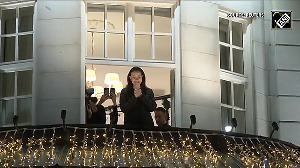As curtains come down on a dreadful year, "fare well, free trade," cries The Economist. "With the global economy facing its worst recession in decades, protectionism is a growing risk," it warns.
The year 2009 will prove to be a litmus test for nations to stay afloat for the problems created solely in the United States.
The volume of international trade is set to fall by two per cent for the first time in 27 years. Fears are already expressed over the right to use what are called bound tariffs which allow nations to raise tariffs to the levels committed at the World Trade Organization. Apparently, a small shift away from the current applied tariffs (that have become the order of day in many developing countries like India) can queer the pitch for beggar-thy-neighborly policies.
The G-20 leaders who met in Washington last month said sternly that nations must not raise their import tariffs from the existing levels or adopt other measures that would add fuel to the protectionist fears.
Alas, the WTO is billed as "a bulwark against protection."
But the trade body is adrift with the Doha Round of trade negotiations for the last seven years. In the normal course, these negotiations would not have been necessitated at all if the champions of the global trade order-- the European Union and United States -- stuck to the principles of built-in agenda. However, they hijacked the agenda of orderly change to rectify their overly trade-distorting farm subsidies.
Instead, they demanded a payment from all the members for the sins they had committed over the last 50 years and forced a phony 'Developmental Round' which is anything but the removal of distortions in both agriculture and services trade. There is no point in apportioning all the blame on them when the leading developing countries, including India, played their part.
Small wonder that after seven years of negotiations, nobody-- either members or trade policy pundits--has any idea how long these negotiations will go on. It is also unclear whether any meaningful results will flow from these negotiations even if they are concluded soon.
Last week's failure to convene a ministerial meeting goes to prove that there is little courage in those who pilot these institutions.
Notwithstanding the fact that there are major political developments in Washington and elsewhere, expectations were raised for months together that the Doha outcome would stall the onward march of protectionism. When it came to calling a spade a spade, especially one dominant player who raised maximalist demands all of a sudden, the pilot developed cold feet and chickened out from convening the meeting. Consequently, the credibility of the WTO is irreparably damaged.
Just when it is required to play a dominant role to address the spectre of recession and protectionism, the trade body appears weak and unable to carry out their mandate. Take, for example, the dispute settlement system which is often touted as the "jewel in the crown."
It is true that the number of trade disputes--which are largely centered on anti-dumping and anti-subsidy (countervailing) measures--has not only increased phenomenally but they are also addressed without much delay.
What is, however, disturbing is that one major player--the United States--often casts doubts on the judges at the Appellate Body, the highest legal limb to resolve trade disputes, whenever an adverse ruling is delivered on its inconsistent trade measures.
More worryingly, it has simply refused to implement some crucial rulings for more than five years. It is an open secret that in the realm of anti-dumping and anti-subsidy disputes, which have a toxic effect on global trade, countries may win a trade dispute against the US. However, there is no guarantee that they would get the expected relief from WTO rulings.
There is no point in crying wolf when developing countries raise their tariffs to bound levels. Surely, India and Vietnam don't have deep pockets to print money to save their automobile or other industries. The damage caused by toxic subsidies and anti-dumping duties is much more pernicious than living under permissible rules. Already, there is a growing shift to bilateral free trade agreements away from multilateral trade liberalistion.
Sadly, the WTO is not in a position to stop the damage caused by dominant players due to its namby-pamby pilots!






